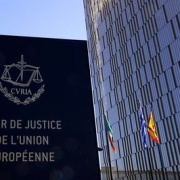RECENT CJEU JUDGEMENT FINDS THAT INCOME OBTAINED FROM UNLAWFUL EMPLOYMENT CAN BE USED AS PROOF OF SUFFICIENT RESOURCES
The Court of Justice of the European Union (CJEU) has recently ruled in Bajratari v SSHD (Case 93/18) that there are no requirements with regards to the source of income in providing evidence of self-sufficiency. It further held that a child is to be considered self-sufficient and not to be a burden on social welfare system of a host State where they are supported by the unlawful employment earnings of a third country national parent.
The case specifically concerned Article 7(1)(b) of Directive 2004/38 which provides two criterion for a Union citizen’s right of residence in a host Member State for a period of over three months.
(i) having sufficient resources for themselves and their family members not to become a burden on the host state’s social assistance system;
(ii) comprehensive medical insurance.
The decision involved the right of an Albanian Applicant, Ms Bajratari, to reside in Northern Ireland in the capacity of the primary carer of two minor Union citizens, who had obtained certificates of Irish nationality. Ms Bajratari’s husband, and father of the minor EU citizens, had been working in Ireland without a residence card or permit, the former which expired in 2014. This income is the only available financial resources to the family.
After the birth of the couple’s first child in September 2013, Ms Bajratari applied for recognition of a derived right of residence under the Directive.
The Court of Appeal in Northern Ireland referenced Alokpa (Case C-86/12) where the CJEU had previously held in paragraph 27:
“the expression ‘have’ sufficient resources in a provision similar to Article 7(1)(b) of Directive 2004/38 must be interpreted as meaning that it suffices that such resources are available to the Union citizens and that that provision lays down no requirement whatsoever as to their origin…”.
However, the decision did not specifically address the issue of unlawful employment and therefore the application was rejected.
The Court of Appeal in Northern Ireland referred two main questions to the CJEU:
- Can income from employment that is unlawful under national law establish, in whole or in part, the availability of sufficient resources under Article 7(1)(b) of [Directive 2004/38/EC]?
- If “yes”, can Article 7(1)(b) [of the Directive] be satisfied where the employment is deemed precarious solely by reason of its unlawful character? [para 17]
The CJEU affirmed that Ms Bajratari’s right to reside was subject to limitations including the condition of having sufficient resources not to become a burden on the social welfare system. [para 28 – 29]
However, the court held that this condition did not contain a requirement as to where these financial resources originated from and therefore does not exclude income derived from the third country national parent’s unlawful employment.
The court confirmed that in such situations there is a greater risk that the minor Union citizen will be dependent on the social assistance system, given the greater risk at losing this income. Nevertheless, the Directive contains provisions allowing the State to act in such situations to protect the social assistance system. Therefore, the CJEU found that excluding unlawful employment would lead to:
Para 42: “a further requirement relating to the origin of the resources provided by that parent, which would constitute a disproportionate interference with the exercise of the Union citizen minor’s fundamental rights of free movement and of residence under Article 21 TFEU, in so far as that requirement is not necessary for the achievement of the objective pursued”.
CJEU noted that Mr Bajratari had paid tax and social security contributions on his income even after his residence card expired.
Excluding unlawful employment income from meeting the social assistance requirement, in a situation where the family have been able to provide for themselves for ten years without relying on the social welfare system goes manifestly “beyond what is necessary in order to protect the public finances of that member state”. [para 46]
The court rejected the UK government’s argument that a restriction of the free movement rights of the couple’s children was justified on the grounds of public policy. [para 52]
In conclusion, Mr Bajratari’s employment was held to be satisfactory under the concept of sufficient resources despite it being unlawful. This is a very positive decision from the CJEU, one which highlights the interdependence between the right to work and the right to reside.
A third country national parent must have a right of residence to obtain a work permit. Yet often require the right to work in order for their EU citizen child to fulfil the conditions under the Directive to reside in the host state. Therefore, the exclusion of income derived from unlawful employment would inherently reduce the family’s chance of acquiring the right to reside in the host state.
The CJEU has underscored and promoted the rights of Union citizens in this decision.
The judgement can be read in full here

